#Christian shepherd
Text
A very short analysis of all* the dads and daddy issues on lost
*Considering every character that was a main character

Daniel
Charles widmore- complete sociopath in many ways, only met Daniel when he was an adult to manipulate him into going to the island on which he would be killed by his mother which Charles witnessed
Boone
Split up with his mother at some point, was clearly left with a nanny frequently enough to kill her, definitely has unresolved issues with his dead stepfather as he fell in love with the stepsister
Miles,
Very obvious dad issues from being raised without him present. Did get to meet him but he was a bit of a dick tbh. I guess he did love him but too little too late
Michael
Little known about his dad but only his mum was looking after Walt off island. His role as a dad could be interpreted as daddy issues
Ana Lucia
Deffo has mommy issues but the lack of clear father figure points to possible daddy issues as does her time with Christian
Charlotte
Goes to shithole island to try to discover her father who was never there. Clearly has daddy issues regardless of her fathers (unknown) quality.
Frank
Has issues but there’s every chance they are NOT daddy issues. Good for him
Shannon
He’s dead and his widow is a terrible stepmother. Daddy issues up to here-may have contributed to her sleeping with her brother
Desmond
He had to raise his siblings so this points again to an absent (at the very least emotionally) father. Daddy issues
Eko
Had to raise his brother suggesting a largely absent father who wasn’t around much
Kate
Blew up her real father due to his general terribleness, her stepfather was in the army so probably has issues over him not being around all that much even though he seems like an alright guy
Jack
Jacks daddy issues regarding Christian are basically a main plot point of the show and even made it into the finale. Points to Christian for feeding into a lot of the characters daddy issues
Sawyer
Dear Mr Sawyer… probably the nastiest daddy issues, doesn’t really get much worse than murder suicide with your kid under the bed. All of sawyers bad bits are due to his daddy issues. Also has daddy issue ties to Christian and Anthony
Locke
Attempted murder was a pretty bad look from Anthony as was the kidney theft. Anthony traveled across the world giving kids daddy issues left right and centre, despite only Locke being shown as his biological kid
Ben
Skeletor was not a great dad and is a key reason captain bunny killer is so messed up. Also bens habit of adopting children (Ethan, Alex) is likely linked to his own crappy upbringing
Sayid
His dad the war hero gave him some toxic masculinity problems, sayid not killing a chicken is our only main clue but it was pretty dark
Libby
Like everything involving Libby’s past, her parents are a big mystery. She does have dead husband issues?
Sun
Mr Paik for sure messed Sun up. His treatment of Jin and his general murdery tendency affected sun not only as a child but also screwed up her marriage
Jin
Jins dad is the nicest guy on the list, but jin had intense daddy issues due to his shame and being raised by a single father.
Claire
Christian really putting it out of the park here! Being the result of an affair involving an American doctor cannot have been fun and his absence in her life probably didn’t help with her wanting to give Aaron up. Also may have contributed to her not trusting Charlie that much
Hurley
David Reyes is an asshole, but he’s a pretty run of the mill, leave my family and don’t come back til there’s money, but he made the most effort to fix things. Hugo has big daddy issues tho
Juliet
Pretty standard daddy issues but her parents divorce clearly stayed with her and led her into some pretty unhealthy relationships later on in life
Charlie
Charlie’s dad seems like quite a nice guy if I’m honest but his older brother messed him up enough I’m happy to say Charlie has something very close emotionally to daddy issues
Richard
Too much of an enigma for a strong analysis but imma go out on a limb and say yes
Bernard
I don’t think so?
Rose
She seems pretty well adjusted so I think no
Vincent
Everyone on the island has been his dad at some point- probably missed Walt his original dad a lot
#lost#lost tv#lost abc#lost show#daddy issues#Christian shepherd#jack shephard#john locke#kate austen#daniel faraday#boone carlyle#miles straume#desmond hume#james sawyer ford#hugo reyes
82 notes
·
View notes
Photo



“But don’t beat yourself up about it. It’s fate. Some people are just supposed to suffer. That’s why the Red Sox’ll never win the damn series.”
Lost 1x16: Outlaws (2005)
#lost#lostedit#lostgifs#sawyer#sawyer lost#james ford#christian shepherd#chewieblog#usersource#useroptional#tvfilmsource#filmtvcentral#dailytvfilmgifs#usertelevision#tvcentric#elyse.gifs
137 notes
·
View notes
Text

(self) sacrificial lamb
#art dump#trigun#trigun fanart#trigun stampede#tristamp#vash the stampede#nicolas d wolfwood#vashwood#???#maybe? idk#do yall ever think about how he wouldnt have to be like this if his brother didnt make him like this?#idk anything about christianity btw#this is all going off of really bad secondary school religious studies#technically i think vash is both the shepherd and the lamb#wolfwood is the shepherd too but in a leading the lamb to the slaughter brand of shepherd#i made the lamb black to match how the show portrays them as opposites#also because hes the black sheep from knives' pov
188 notes
·
View notes
Text
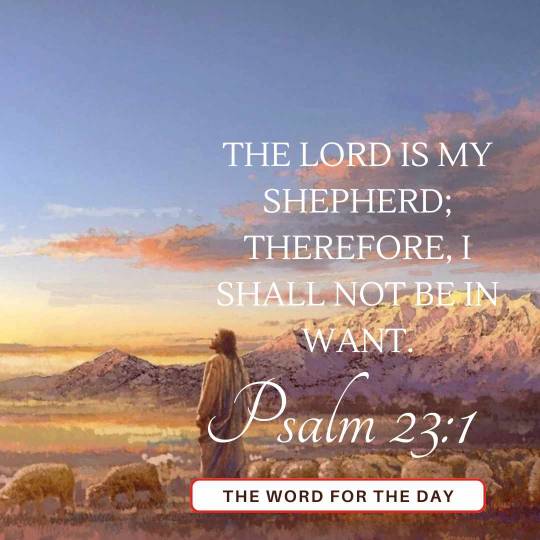
The LORD is my Shepherd; therefore, I shall not be in want. Psalm 23:1
I shall lack nothing, because I have the best possible shepherd taking care of me. He makes me lie down in green pastures. (Psalm 23:1-2) Our Shepherd leads and feeds us. Our Shepherd guards and guides us. Our Shepherd is good and gracious to us forever. Our Lord and Saviour Jesus Christ, is the Good Shepherd who laid down His life for the sheep and then rose again victorious over all our foes. With our Good Shepherd beside us, we have no evil to fear and every good to look forward to! Hallelujah!
#bible verse#daily devotional#christian quotes#bible quotes#inspiration#daily devotion#christian quote#christian life#scripture#bible#good shepherd
232 notes
·
View notes
Text

Amen! 🙏🕊️🙌
#bible#christian blog#god#belief in god#faith in god#jesus#belief in jesus#faith in jesus#encouragement#keep the faith#make him known#the good shepherd#john 16:41
74 notes
·
View notes
Text

Follow The Shepherd
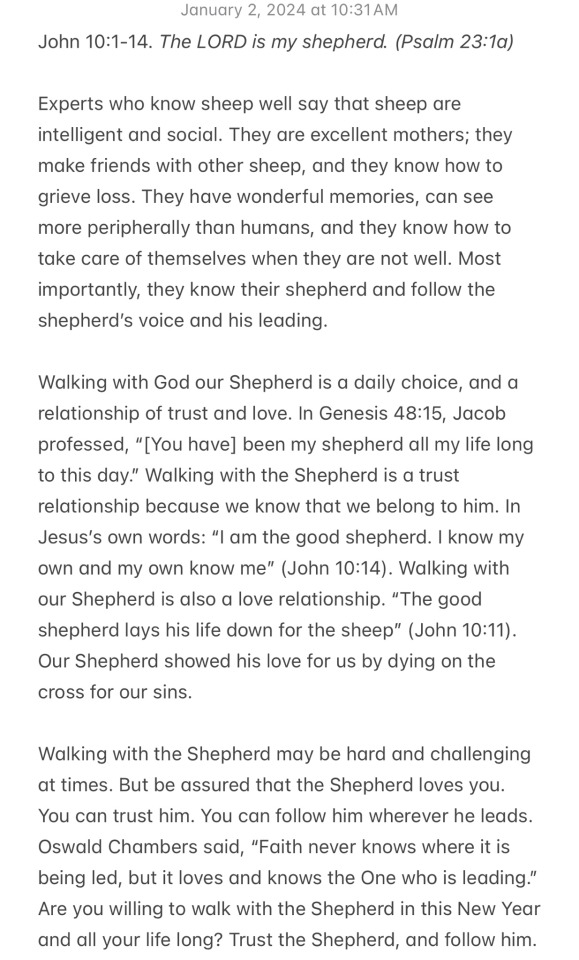
#god#jesus#christ#holy spirit#bible#scripture#christianity#faith#hope#prayer#love#Grace#mercy#shepherd#daily devotional#devotional
68 notes
·
View notes
Photo
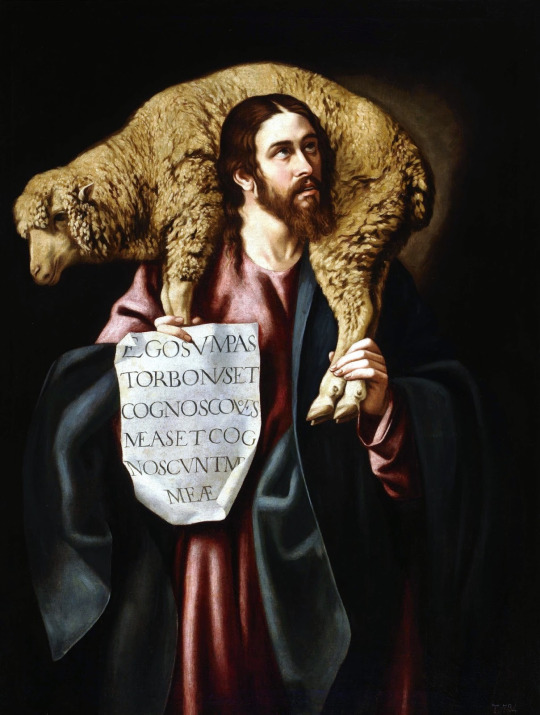
Cristóbal García Salmerón (Spanish, 1603-1666)
El Buen Pastor, 17th century
Museo Nacional del Prado
“I am the good shepherd. The good shepherd lays down his life for the sheep. The hired hand is not the shepherd and does not own the sheep. So when he sees the wolf coming, he abandons the sheep and runs away. Then the wolf attacks the flock and scatters it. The man runs away because he is a hired hand and cares nothing for the sheep. I am the good shepherd; I know my sheep and my sheep know me — just as the Father knows me and I know the Father — and I lay down my life for the sheep. I have other sheep that are not of this sheep pen. I must bring them also. They too will listen to my voice, and there shall be one flock and one shepherd. The reason my Father loves me is that I lay down my life — only to take it up again. No one takes it from me, but I lay it down of my own accord. I have authority to lay it down and authority to take it up again. This command I received from my Father” (John 10:11-18). - The Bible
#Cristóbal García Salmerón#spanish art#spanish#spain#christianity#Christendom#christentum#art#fine art#classical art#traditional art#christian#el buen pastor#the good shepherd#catholic#catholicism#european art#hispanic#hispanola#latin#christian art#oil painting#painting#catholic art#catolicism#1600s#medieval#renaissance
167 notes
·
View notes
Text

Psalm 23:1 AMPC
[1] THE Lord is my Shepherd [to feed, guide, and shield me], I shall not lack.
https://bible.com/bible/8/psa.23.1.AMPC
#faith#bibleverses#christian#verse image#visual verse#verse of the day#bible verse#bible#bible quotes#christianity#psalm 23#daily bible verse#the lord is my shepherd
131 notes
·
View notes
Text
We don’t talk enough about how the reason that the whole “Jews as Christ Killer” trope exists is because the Romans were actually the ones who Killed Christ, but that gets kind of awkward if you’re trying to, say, convert Romans, especially powerful Romans. And it gets especially awkward if you make your official state religion the one based off a guy you killed to keep the peace in one of your colonies.
#antisemitism#scapegoating#early Christianity#Roman empire#sorry for the ‘we don’t talk enough about’ thing#I don’t mean it to be judgemental I just needed a starting off point#but I do find white-washing of the romans role in all this extremely frustrating#honey bee shepherd original
121 notes
·
View notes
Text
adventures in christian opinions about judaism
(reposted from Twitter)
So a while back I started writing a thing on the trio of parables that ends with the prodigal son (which I still need to finish) and like MAN OH MAN do Christian commentators insist that Jews hate shepherds.
Like, I can't even count the number of commentaries that insist that shepherds were "despised figures" for first-century Jews and the parables of the lost sheep and lost coin were designed to insult the Pharisees by comparing them first to a shepherd and then to a woman.
So, as is my wont whenever Christian commentators make a claim about what was normal for first-century Judaism, I decided to try to hunt down their source on this.
As I've said many times, when it comes to Christian parable interpreters' claims about what attitudes/beliefs/etc. were normal for first-century Jews, get used to the phrase "no sources are cited."
I mean, first off, as a 21st-century Jew, the insistence that 1st-century Jews hated shepherds rings odd, given that <checks notes> Abraham, Isaac, Jacob, Rachel, all of Jacob's kids (the founders of the tribes), David, etc. were all sheep-tenders. The image of God as a shepherd is pretty consistent throughout the Tanakh. That image reappears in the Qumran texts, which as far as I know, are one of the few Jewish sources we have from 1st-century Judaea.
The term "despised" gets used a lot, so I decided to dig into that one.




When I was able to find citations, I traced them back to an 1882 commentary by a guy named Frederic Farrar.
Farrar cites Heinrich Meyer as a source for this, but when I looked up THAT citation, it's Meyer saying that shepherds were a "lowly but patriarchally consecrated class" -- in other words, poor, but with a distinguished history and status.
So that's why everyone's tossing the term "despised" around--because Farrar just made it up. But what about primary sources? I went back on the hunt.
Surprisingly, in a number of reference works, like glossaries and Jeffers's "Greco-Roman World of the New Testament," I found similar assertions about the common attitude toward shepherds, for which they cited...
<drum roll>
Aristotle. You know, the Greek guy who lived 300 years before Jesus? Definitely a reliable source for Jewish attitudes of the time.
Some people cited Philo's On Agriculture. Okay, Philo was at least Jewish and lived when Jesus would have, although he was a wealthy Hellenized Jew living in Alexandria rather than a Pharisee living in the Galilee. But okay, at least it's the right culture and time period. (The reference in Philo turns out to be talking about the section of Genesis in which Joseph's brothers come visit him in Egypt. It talks about how they were proud to be shepherds, and criticizes (gentile) kings who look down on shepherds.)
Then we've got Mishnah Kiddushin, in which a bunch of rabbis are having a debate about which professions make you trustworthy vs untrustworthy, and one rabbi lists everyone from camel-drivers to herders to barbers to shopkeepers as untrustworthy. Another rabbi comes back and is like, nah, all those people are fine upstanding folks; it's doctors and butchers you've gotta watch out for. So they're citing one cranky dude with a LONG list of people he doesn't like, who immediately gets shot down, as evidence of the normative attitude for Jews about a century earlier.
Oh, and we've got a citation of Midrash Tehillim which says that God-as-shepherd doesn't have any of the failings of humans-as-shepherds, which... sure. Also, it was codified in the 1300s?
The most compelling citation is from the Talmud (Sanhedrin 25b), in which the rabbis discuss who's qualified to be a legal witness. They exclude shepherds, because shepherds graze their animals on other people's land, which some of the rabbis see as a type of theft.
The Talmud is a record of debates, but this passage definitely makes it sound like this is a majority opinion. (It should be noted that the passage disqualifies all KINDS of people, from those who lend with interest to those who fly pigeons, as having conflicts of interest.)
But the important thing here is that the Talmud includes records of debates from as late as the 4th or 5th centuries CE (300-400 years after Jesus's time), and the passage makes a point of noting that the disqualification of shepherds as witnesses is a later development.
So in other words, the idea that the Pharisees hated shepherds and would have been insulted by Jesus telling a story in which the protagonist was a shepherd is based either on Greek attitudes that are 300 years too early or Jewish ones that are 300-400 years too late.
But people will twist themselves into citation knots (or just not bother citing a source at all) to insist that this was a common attitude so they can position the Pharisees as hating those charming humble shepherds and their fuzzy little lambs.
As to WHY this idea seems to be so important to them, well, you cannot read about Luke 15 without encountering the word "outcast" roughly 90 times per page.
The framing is Jesus was friend to The Outcasts while the Pharisees despised The Outcasts and the Lost Sheep, Coin, and Sons are all parables about accepting The Outcast.
Never mind that neither the sheep, the coin, nor either of the sons got kicked out of their communities. The sheep wandered off, as sheep are wont to do, the coin was lost by its owner, and the younger son decided to leave to go on a spending spree while the older son declined to attend the welcome back party for him after his dad managed to hire a band and caterers but never thought to let his own son know what was going on and he had to find out from a hired hand.
Moreover, the term "outcasts" gets used as a synonym for "tax collectors and sinners." Tax collectors were usually pretty well-off because they ran a protection racket for the Romans. Outcasts? I mean, I guess? But hardly in the "marginalized and powerless" sense.
As far as "sinners," the NT doesn't usually bother telling us what, exactly, they did to "sin," but on the rare occasions when it does offer that context, it's almost always wealthy people.
But why talk about that when they can present the objection the Pharisees had to Jesus's dining with "tax collectors and sinners" as the Pharisees despising lowly outcasts, and insist that the Pharisees hated the idea of such people repenting and returning, and so Jesus was tweaking their noses by comparing them to shepherds and women.
As if, you know, teshuvah wasn't something the Pharisees were ALL ABOUT. If you want to actually understand, consider that the iconic tax collector in the parable of the Pharisee and the tax collector shows no inclination to STOP being a tax collector.
The objection wasn't you're having a friendly dinner with poor lowly outcasts for whom we have contempt. It was you're having a friendly dinner with people who are extorting their neighbors on behalf of the invaders who kill us for looking at them funny and have expressed no intention to stop doing that.
Now, there's a good discussion to be had about whether shunning Trump lawyers and Marjorie Taylor-Greene donors or inviting them to dinner and trying to win them over with compassion is more effective, more ethical, more compassionate (to whom?), etc.
But presumably we can see why people of intelligence and goodwill might disagree on which of those approaches is the right thing to do, and why such people might might object to the strategy they don't agree with.
But what really gets me is that Christians have the utter fucking NERVE to paint the Pharisees as inhumanly awful for not wanting to have dinner with tax collectors while viewing Corinthians as Holy Writ:

I mean, Paul's all YOU MUST SHUN ALCOHOLICS AND PEOPLE WHO ARE GREEDY and Christians are like yes, that makes sense, but if the Pharisees are like, no, I don't want to have dinner with that guy who narced on my cousin and got him crucified, Christians are like, they're monsters.
Cool, cool.
Anyway, this has been your weekly edition of Christians Need To Stop Just Making Shit Up About Jews And Then Citing Each Other Like It's Fact.
And there were a lot of "I've never heard anyone say Jews of Jesus's time hated shepherds..." responses: Maybe you haven't, but that doesn't make it uncommon.
Sources in which I've found it:
Craig Blomberg (Denver Seminary, Society of Biblical Literature, Tyndale House, NIV translation committee)
Jared Wilson (professor at multiple Baptist seminaries)
Stephen Wright (Spurgeon College (British evangelical college))
Arland Hultgren (Luther Seminary (ELCA))
Kenneth Bailey (Presbyterian/Episcopalian)
Joachim Jeremias (Lutheran, cited EVERYWHERE)
Bernard Brandon Scott (Disciples of Christ, the Jesus Seminar)
Klyne Snodgrass (Evangelical Covenant Church)
Barbara Reid (Catholic Biblical Association)
That particular trope spans denominations, decades, etc. It's not a fringe viewpoint.
#christian exegesis#antisemitism#jumblr#citational politics#bad methodology#parables#pharisees#first century judaism#second temple judaism#good shepherd#prodigal son#why are christians like this?
366 notes
·
View notes
Text

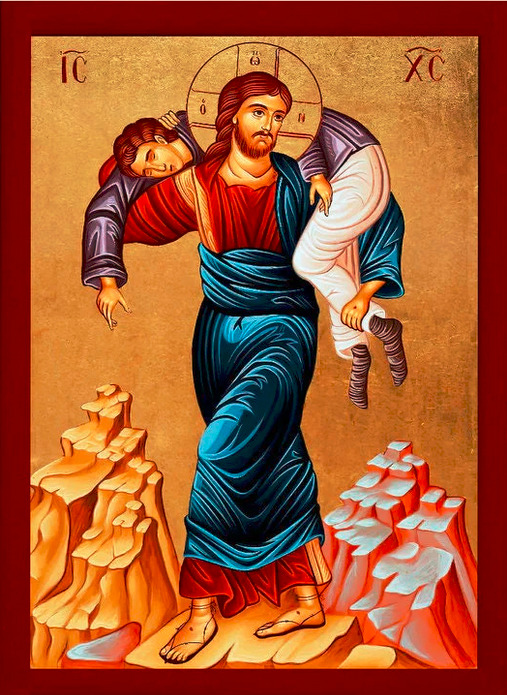
I can't carry it for you, but I can carry you and it as well.
Samwise Gamgee (J.R.R. Tolkien's The Return of the King)
#Christianity#Catholicism#Good Shepherd#Jesus Christ#Adam and Eve#Lord of the Rings#Samwise Gamgee#J.R.R. Tolkien#Parable of the Good Samaritan#suffering#compassion#icon#redemption#grace
100 notes
·
View notes
Text

The Parable of the Lost Sheep:
Redemption and Restoration
In the parable of the Lost Sheep, Jesus conveys a deep message about the relentless pursuit of redemption and the boundless grace of God. Let us delve into this timeless story and explore its significance in our lives today.
A certain shepherd had a hundred sheep, yet one of them strayed from the fold. Undeterred by the ninety-nine, the shepherd embarked on a relentless search for the lost sheep. He scoured the hills and valleys until, at last, he found the wayward sheep, weary and alone.
Filled with compassion, the shepherd tenderly lifted the sheep onto his shoulders and rejoiced, calling together his friends and neighbors to celebrate the sheep's return. In the same way, Jesus explains, there is more joy in heaven over one sinner who repents than over ninety-nine righteous persons who need no repentance (Luke 15:3-7).
This parable reminds us of the depth of God's love and his unwavering commitment to seek out and restore the lost. Just as the shepherd pursued the lost sheep, so too does our Heavenly Father pursue each one of us with relentless love and compassion.
No matter how far we may have strayed, God's arms are always open wide, ready to welcome us back into His embrace. His grace knows no bounds, and His forgiveness is freely offered to all who humble themselves and turn back to Him.
The parable of the Lost Sheep challenges us to reflect on our own lives and consider those areas where we may have wandered away from God's path. It beckons us to return to the fold, to repent of our sins, and to experience the joy of reconciliation with our Heavenly Father.
Just as the shepherd rejoiced over the lost sheep's return, so too does God rejoice over each one of us when we turn back to Him. Our repentance brings joy to heaven, and our restored relationship with God brings fulfillment and purpose to our lives.
Broader context:
Parable of the Lost Sheep (Luke 15:3-7):
This is the main passage where the parable is found.
God's Pursuit of the Lost:
Ezekiel 34:16 - God seeks out the lost and brings them back to safety.
Isaiah 53:6 - We all, like sheep, have gone astray, but the Lord laid on Jesus the iniquity of us all.
Matthew 18:12-14 - Jesus' teaching about the shepherd who leaves the ninety-nine to seek the one lost sheep.
Psalm 119:176 - Like a lost sheep, seek your servant, for I have not forgotten your commands.
God's Rejoicing over Repentance:
Luke 15:10 - There is joy in the presence of the angels of God over one sinner who repents.
Luke 15:32 - It was fitting to celebrate and be glad, for your brother was dead, and is alive; he was lost, and is found.
Acts 3:19 - Repent therefore, and turn back, that your sins may be blotted out.
God's Unfailing Love and Faithfulness:
Psalm 23:1-3 - The Lord is my shepherd; I shall not want. He makes me lie down in green pastures. He leads me beside still waters. He restores my soul.
Psalm 36:5 - Your steadfast love, O Lord, extends to the heavens, your faithfulness to the clouds.
Psalm 136:1 - Give thanks to the Lord, for he is good, for his steadfast love endures forever.
Lamentations 3:22-23 - The steadfast love of the Lord never ceases; his mercies never come to an end; they are new every morning; great is your faithfulness.
The Shepherd's Role as a Metaphor for Jesus:
John 10:11 - I am the good shepherd. The good shepherd lays down his life for the sheep.
Hebrews 13:20 - Now may the God of peace who brought again from the dead our Lord Jesus, the great shepherd of the sheep, by the blood of the eternal covenant.
Call to Repentance and Restoration:
Joel 2:12-13 - "Yet even now," declares the Lord, "return to me with all your heart, with fasting, with weeping, and with mourning; and rend your hearts and not your garments."
Revelation 3:20 - Behold, I stand at the door and knock. If anyone hears my voice and opens the door, I will come in to him and eat with him, and he with me.
The Joy of Salvation:
Romans 15:13 - May the God of hope fill you with all joy and peace in believing, so that by the power of the Holy Spirit you may abound in hope.
Psalm 51:12 - Restore to me the joy of your salvation and uphold me with a willing spirit.
Questions:
Have I strayed from God's path, and if so, am I willing to humble myself and turn back to Him?
Do I fully grasp the depth of God's love and His relentless pursuit of me, even in my moments of wandering?
How can I share the message of God's grace and redemption with others who may feel lost or disconnected from Him?
What steps can I take to deepen my relationship with God and experience the fullness of His joy and restoration in my life?
Let us pray:
Heavenly Father, we thank you for your unwavering love and grace, demonstrated to us through the parable of the Lost Sheep. Give us the courage to humble ourselves, repent of our sins, and return to you with open hearts. May we never forget the depth of your love for us and the joy that comes from being reconciled to you. In Jesus' name, amen.
#ParableOfTheLostSheep#Redemption#Restoration#GodsLove#Grace#Repentance#Reconciliation#Joy#Sermon#Prayer#christian blog#christian faith#compassion#christianlife#christianity#jesus christ#salvation#jesus#god#biblestudy#holy bible#bible verse#bible scripture#christian#bible study#bible#biblicalteachings#biblical studies#lost sheep#good shepherd
27 notes
·
View notes
Text
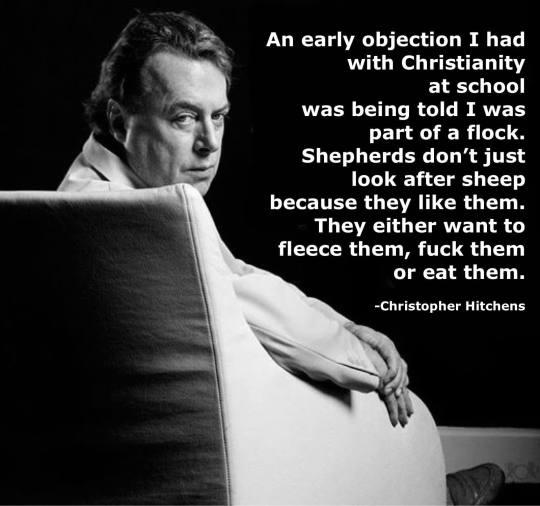
"An early objection I had with Christianity at school was being told I was part of a flock. Shepherds don't just look after sheep because they like them. They either want to fleece them, fuck them or eat them."
-- Christopher Hitchens
#Christopher Hitchens#christianity#flock#for i am not a sheep#the lord is not my shepherd#religion#religion is a mental illness
160 notes
·
View notes
Text
I actually enjoy Bruce Wayne as a character a lot, and while I love expounding at length about his flaws and failures, I also like it when he's portrayed as a likeable person.
This might come as a surprise because I'm such a hater about him constantly. But I only act that way because too many people hold up a picture of him being nice to a random child and then say, "Does THIS look like an abuser to you? 🥺"
Which makes me want to bite something—because, you thoughtless ass, that's not how abuse works.
#Btw‚ ''Christian'' Batman fans. I can hardly think of a more spiritually poisonous ''shepherd'' of a dad in fiction than canon Bruce Wayne.#Quit it with the ''prodigal son'' and ''forgiving godly father'' bullshit. Batman is not like Jesus.#rant#negativity
29 notes
·
View notes
Text
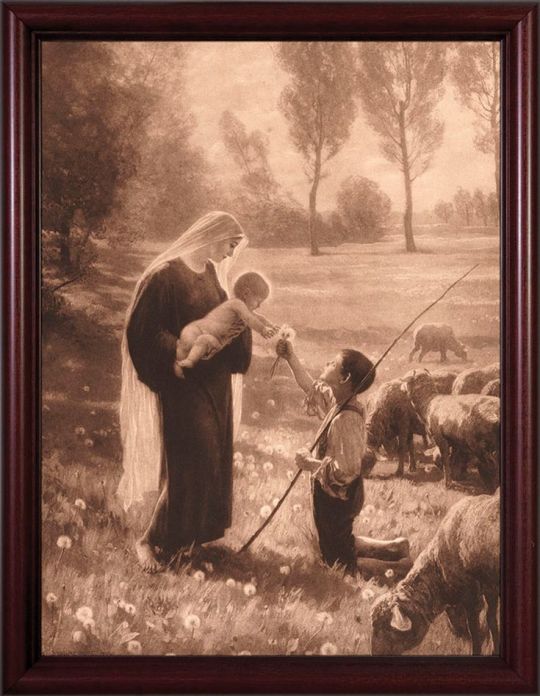
The Gift of the Shepherd - Josef Scheurenberg, 19th century lithograph
#Christian art#Madonna and Child#Virgin Mary#Christ Child#Lord Jesus#Theotokos#Panagia#The Gift of the Shepherd
127 notes
·
View notes
Text

'The Good Shepherd' Early Christian Tiny Roman Intaglio, Corinium Museum, Cirencester
#Roman#romans#roman belief#early religion#early christianity#Roman art#Roman crafts#roman living#roman empire#roman britain#jewellery#intaglio#shepherd#archaeology#relic#beliefs#Corinium
16 notes
·
View notes